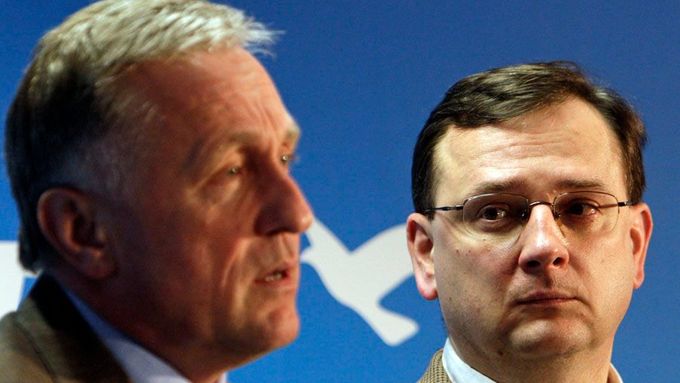Prague - New Czech government was officially sworn in today by President Václav Klaus.
The center-right coalition of three parties led by Petr Nečas from the Civic Democratic Party (ODS) will follow the reform course pioneered by the government of Mirek Topolánek in 2006-2009.
The government composed by the right-wing ODS, conservative TOP 09 and centrist Public Affairs states in its coalition treaty that it wants to curb the public deficit, reform pension and health care systems, support entrepreneurship and fight corruption and bureaucracy.
Read more: New Czech and Slovak governments: How do they match up?
Read more: Czech Republic doubles down on austerity measures
And it appears that the government wants to use the methods already pioneered by Topolánek (ODS), whose government failed to gain vote of confidence in 2009. This is not so surprising given the fact that new PM Nečas (ODS) and Finance Minister Miroslav Kalousek (TOP 09) were one of the most important authors of the reforms proposed by Topolánek's government - Nečas was the minister of social affairs, Kalousek was the finance minister.
More political stability
However, the freshly sworn-in government has one significant advantage over its predecessor - a comfortable majority of 118 out of 200 seats in the Chamber of Deputies.
The new government plans to curb the deficit by saving on state operational expenses and welfare benefits. While Topolánek's government failed to cut the number of state employees by 9 percent in three years, Nečas wants to cut it by 10 percent in one year.
Read more: After election:Czechs to become Europe's reform leaders
In 2008, Nečas managed to cut various welfare benefits and raise the retirement age. However, this was only the phase one of his reform. The second phase, which consists of reinforcing private pension funds, will be implemented by the new government.
Unlimited trial period
In Topolánek's cabinet, Industry Minister Martin Říman was responsible for supporting Czech business. Today, Říman leads a team of advisers for PM Nečas.
In 2006-9, Nečas was a proponent of simpler legislation and tax systems, especially for entrepreneurs. In the new government, he wants to help small and medium enterprises, for example by abolishing the obligation to pay VAT on unpaid invoices.
Nečas will try to liberalize the labor code, which is something Topolánek's government did not manage to do even though it was one of its key priorities. If successful, the reform will make the trial period unlimited and notice period shorter.
Read more: New Czech Prime Minister sworn in,coalition talks go on
In addition, the government has already stated it will cut lawmakers' salaries and avoid any tax hikes. On the other hand, there will be increased subsidies and investments. The government will construct new highways with money borrowed from private banks within the framework of the projects of PPP.
The anti-corruption measures the new government will try to implement are the same as those unsuccessfully proposed by ex-Interior Minister Ivan Langer from the government of Mr Topolánek. The only difference is that the new government would like the details of all public tenders to be published online. Both anti-corruption reform projects were prepared by Zdeněk Zajíček, an ex-deputy at the interior ministry.
Less environmental concern, more caution about euro
The Green Party which formed a part of Topolánek's coalition did not manage to pass the 5 percent threshold in the poll in May 2010, which means that environmental issues are going to be addressed to a significantly lesser degree by the new government which, for example, supports the idea of finishing the reconstruction of nuclear power plant Temelín.
The government of PM Nečas has also adopted some health care and education priorities of Topolánek's government.
There are some differences as well, the most significant one caused by the recent developments concerning the euro. While Topolánek's government in 2006 expressed its support for the European integration and willingness to introduce euro, the new government is much more reserved towards the EU.
„If the common European currency develops as a purposeful and sustainable project, we will prepare for the introduction of the euro in the Czech Republic," says the government coalition of a country which pledged to introduce euro in an international treaty.
